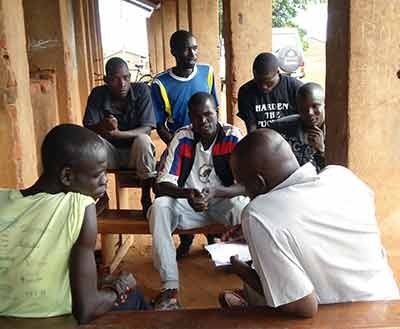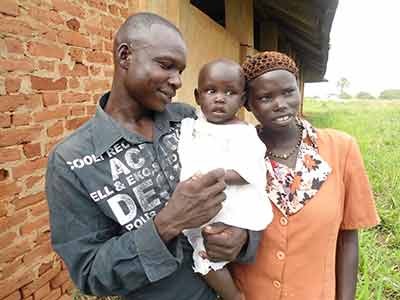- What We Do
- Agriculture and Food Security
- Democracy, Human Rights and Governance
- Economic Growth and Trade
- Education
- Ending Extreme Poverty
- Environment and Global Climate Change
- Gender Equality and Women's Empowerment
- Global Health
- Water and Sanitation
- Working in Crises and Conflict
- U.S. Global Development Lab

In Northern Uganda, an area that lived 23 years of civil conflict, more than half of all women aged 15–49 have experienced some form of violence. There is also ample evidence that nearly all children have experienced physical abuse, most frequently, in their homes. These dramatic facts have prompted the U.S. Agency for International Development (USAID) and its implementing partners to launch an innovative mentoring program that targets young fathers (ages 16–25) and teaches them how to build positive relationships and parenting skills.
"We know that programs that involve men in violence prevention initiatives are more effective than programs that target women and girls exclusively," says Linda Sussman, USAID Senior Research Advisor with the Office for Population and Reproductive Health. "Because violence often begins in the family unit, it is essential to involve fathers from the get go and to create support mechanisms within the community for men who are willing to change and to become positive role models."
With funding from USAID, the Georgetown University's Institute for Reproductive Health in partnership with Save the Children launched the Responsible, Engaged and Loving (REAL) Father's Initiative in 2013 in the Amuru District of Northern Uganda. The purpose of this project was to reach young men before they developed strong ideas, expectations, attitudes, and behaviors toward parenting and relationships.
"We wanted to address the underlying causes of domestic violence," explains Kim Ashburn, senior Research Officer with the Institute for Reproductive Health at Georgetown University. "The intervention was intentionally designed to challenge the gender norms and sexual scripts that often trigger coercion and violence in relationships and to teach effective parenting, communication, and problem-solving skills."

In addition to experiencing multiple physical and mental health side effects, early childhood experiences of violence have shown to cause experiences of violence in adulthood. This is true for both boys and girls, where boys who witness or experience domestic violence are more likely to perpetuate relationship violence, and girls are more likely to be victims of gender-based violence in adulthood. This project sought to test a new approach meant to break this vicious cycle of intergenerational violence.
About 500 fathers participated in this initiative, though not all benefitted from the project activities, and some served as control groups. A community mentor was assigned to groups of up to four fathers and met with them regularly, either counseling them alone or with their spouses. The mentors also organized monthly group discussions and in so doing, provided the young men a safe space for addressing issues of concern. Messages that emphasized positive parenting skills and the attributes of the REAL Fathers Initiative were also disseminated through a series of community posters.
Evidence from the baseline survey indicated that many of these young men had experienced violence themselves when growing up, and as adults, they struggled with alcohol consumption and peer pressure. "When I started to make changes, some community members mocked me," says Peter, a 24-year-old REAL father. "Others accused the mentors of inciting my wife against me. Some even thought my wife used witchcraft on me because the changes shocked so many people in my community."
Indeed, after the project was implemented, things started to shift at the community level. A final evaluation indicated that fathers enrolled in the project were less violent toward their spouses and children and disapproved of using physical force. Disciplining children involved much less hitting and shouting, and 77 percent of trained fathers voluntarily shared with other men in the community what they learned. Of note is also the fact that fathers who had an alcohol problem were drinking less and demonstrated greater willingness to help their wives with household chores.
"Before the REAL Fathers Initiative, my husband would return home and without even asking any details he would insult me, even in the presence of our children. Sometimes, he would beat them up, too," said a young spouse during a confidential interview. There is no doubt that communication skills have benefitted both men and women. "Currently, the family relationship has improved. Now when he comes home, he greets everybody, plays with the children and takes time to discuss with me how we can strengthen our family."
This type of intervention has the power to transform, a word that Peter himself used to describe his own journey as a REAL father. "This is a project that transforms the foundation of the Acholi culture and the lives of young people who started to have children early. Benefitting from the mentoring sessions has also set a different pace between us and our own fathers."
Find out more about the REALFathers Initiative.







Comment
Make a general inquiry or suggest an improvement.